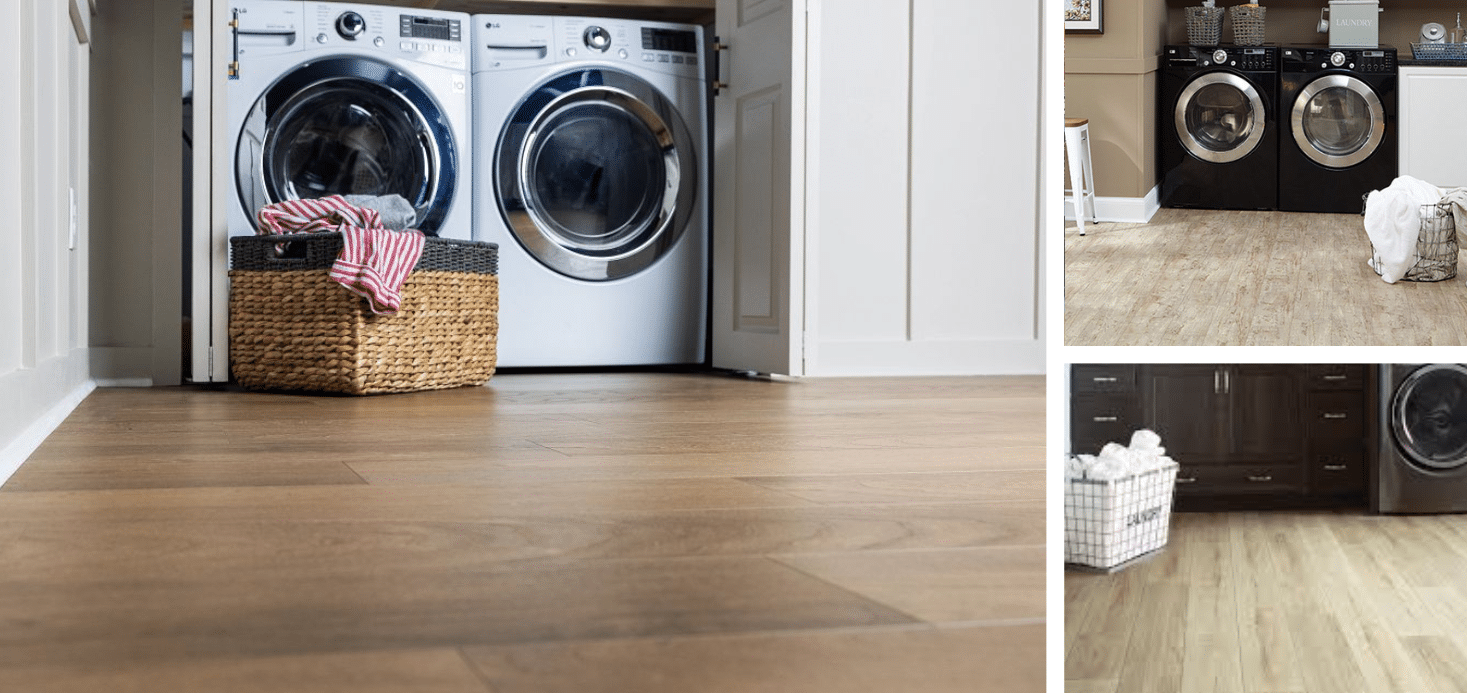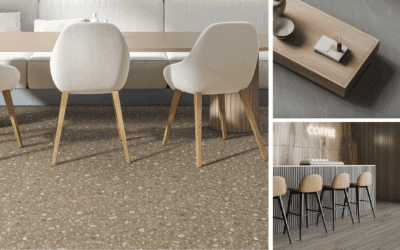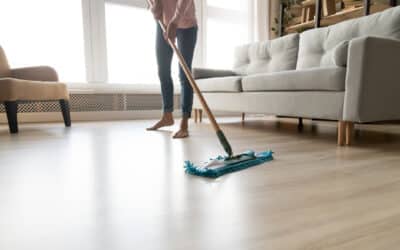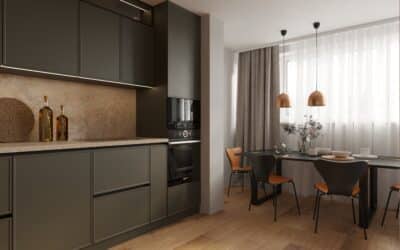Laundry rooms experience heavy foot traffic, high humidity, and frequent water leaks. Before choosing the best flooring for a laundry room, it’s key to consider the issues within the room and to know which style works best for your preferences and budget.
Keep reading to learn about the best flooring for laundry rooms.
What Type of Flooring is Best for Laundry Rooms?
The best flooring for laundry room or mud room includes waterproof wood, laminate flooring, or luxury vinyl flooring. They can withstand the harsh environments of a laundry room, like heavy loads, frequent foot traffic, and high humidity. Laminate and luxury vinyl are also affordable options that require less expertise to install.
Tile and stone flooring can also be used in a laundry room. However, these options are more expensive than vinyl and laminate. They are also more difficult to fit without expert knowledge. Plus, when installed in poorly ventilated laundry rooms, they can cause other issues, like damp problems.
1. Laminate Flooring
Laminate flooring is an excellent choice for laundry rooms. Waterproof laminate offers protection against spills, leaks, and humidity without warping. With a huge range of colors and patterns available, laminate is easy to match with any décor scheme.
One of the major benefits of using laminate in a laundry room is the ease of access it provides to the subfloor. Should a leak occur, laminate can easily be lifted and refitted. However, care should be taken during removal to prevent damaging the locking joints.
Laminate flooring is also affordable, easy to clean, and highly scratch resistant. It can withstand heavy foot traffic and the load of washers and tumble dryers. Adding extra protection is still a good idea to prevent weakening the boards over time.
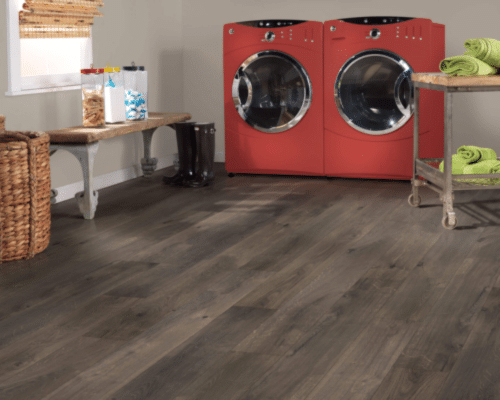
For example, installing floor glides, protective pads, or a heavy-duty floor protection board under the appliance can prevent damage from the prolonged heavy weight and movements during spin cycles.
2. Waterproof Hardwood Flooring
Waterproof hardwood flooring can also be used in laundry rooms for a natural aesthetic. Made from solid wood with a highly resilient core, it’s strong and very easy to clean (we recommend using a bona mop or bona professional).
Waterproof wood offers a high-end look for the laundry room and is a more luxurious option compared to luxury vinyl and laminate. Waterproof hardwood can also last a long time and has a stable, strong waterproof core.
It can withstand heavy loads and impact with ease. This is important for laundry rooms, which are used frequently and weighed down with appliances.
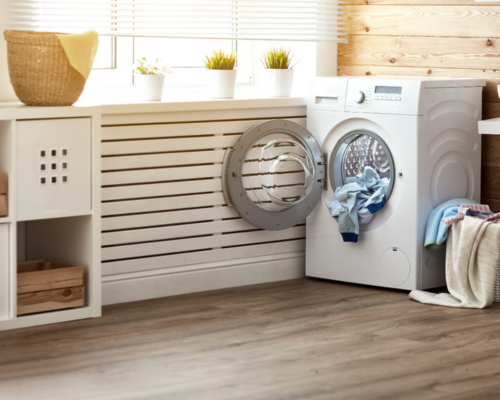
For example, installing floor glides, protective pads, or a heavy-duty floor protection board under the appliance can prevent damage from the prolonged heavy weight and movements during spin cycles.
3. Luxury Vinyl Flooring
One of the many benefits of luxury vinyl flooring is that it’s inexpensive, easy to fit, and waterproof. Vinyl withstands the high-humidity environment of a laundry room and offers maximum protection against leaks.
Available in a variety of patterns with a noticeable grain finish, it offers a clean aesthetic. Highly resilient to scratches, luxury vinyl flooring is resilient when replacing or repairing washing machines and dryers.
When fitting luxury vinyl in laundry rooms, choose a durable product and pair it with the right underlayment.
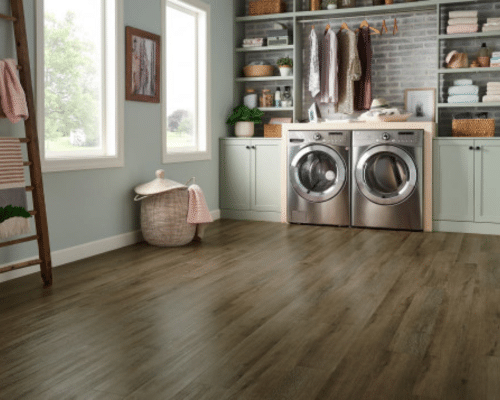
Our Happy Feet range of vinyl flooring is the ideal choice for laundry rooms.
4. Tile Flooring
Available for a higher price tag, tile flooring can be used in laundry rooms for a clean, shiny, and scratch-free aesthetic. With a variety of colors, patterns, shapes, and textures on the market, tiles can be paired with any décor scheme.
However, tile flooring can cause damp issues in laundry rooms if the space is not well-ventilated. Moisture produced from washer-dryers can be intensified when it hits the cold tiles, causing wet, slippery floors.
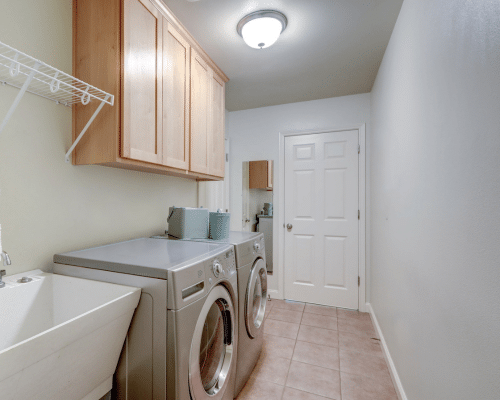
5. Stone Flooring
Stone can be used in laundry rooms for a natural look but is expensive. While it offers a luxurious finish to a room, stone flooring is not the most resilient to moisture.
Water exposure, like leaks or humidity from washer-dryers, can cause unappealing stains in a short space of time. It can worsen damp issues due to how quickly it absorbs moisture.
Natural stone flooring can also be prone to scratches and cracks when moving appliances. Care should therefore be taken when conducting maintenance.
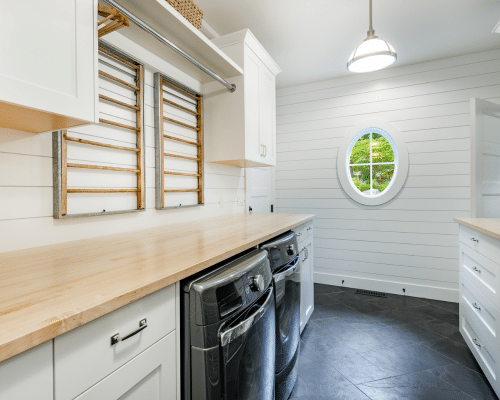
Additionally, stone flooring can feel ice cold to the touch, making it uncomfortable to walk on barefoot.
Can You Put Laminate Flooring in a Laundry Room?
Yes, laminate flooring can be used in a laundry room, provided you install waterproof laminate. Being highly affordable, long-lasting, and easy to install, laminate is an easy, universal choice of flooring for laundry rooms.
What are the benefits of installing laminate flooring in laundry rooms? It’s waterproof, scratch-resistant, quick to clean, and easy to remove in the event of a water emergency. Laminate is also available in a vast variety of colors.
Few downsides exist to using laminate flooring in laundry rooms. Choosing a waterproof laminate will be highly resistant to humidity, leaks, and spills.
What is the Best Surface For a Washing Machine?
Washing machines are heavy appliances that can leak at least once during their lifespan. Therefore, the best surface for a washing machine is any flooring that’s strong, durable, and waterproof.
The most suitable flooring for laundry rooms is waterproof hardwood flooring, waterproof laminate, or dent-proof luxury vinyl flooring. Our best ranges for under washing machines are Raintree waterproof wood, TORLYS laminate, and Happy Feet luxury vinyl.
Stone, concrete, and tile can also be fitted under a washing machine. These surfaces offer protection against spillages (with tile offering the best protection of the three). However, stone and tile can cause damp issues in a laundry room if the room is not suitably waterproofed.
Summary
Overall, laminate, luxury vinyl, and waterproof wood are waterproof, scratch-resistant flooring options that can withstand the daily pressures of a laundry room.
Tile, stone, and concrete can also be used for utility areas. However, care should be taken to prevent stains, scratches, and damp issues (particularly if the space is poorly ventilated).
When choosing the best flooring for a laundry room, it’s important to consider both practicality and aesthetics. Laminate, luxury vinyl, and waterproof hardwood all offer a natural look, with slight differences in their appearance.
Waterproof wood offers a warm, high-end, natural beauty to floors. Luxury vinyl looks incredibly realistic, particularly if in a wood tone, with a textured feel underfoot. While laminate provides a smooth, consistent, and slightly shiny finish.
To help you decide which is the best bedroom flooring for you, use our visualizer. Simply upload a picture of your bedroom, test out different flooring types, and find your dream flooring today!
